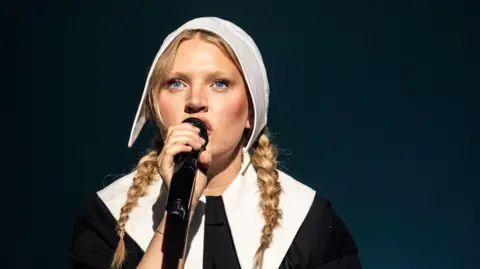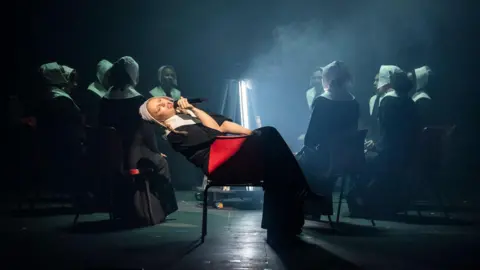Music Correspondent
 Aaron Parsons Photography
Aaron Parsons Photography“Please be upstanding for the world’s most confusing House of Games contestant and Bake Off failure, Self Esteem!”
This is how Rebecca Lucy Taylor – aka celebrated pop singer Self Esteem – is introduced to the stage at London’s Duke of York’s Theatre.
It’s a typically irreverent comment, an example of the dry wit she uses to sweeten the sincerity and anger of her music.
“You can take piccies and videos,” the off-stage voice continues, “because she needs all the help she can get.”
That, too, is strictly tongue-in-cheek.
Three years ago, Taylor released her second album, Prioritise Pleasure, a body-shaking manifesto for female self-worth that bristled at society’s expectations while acknowledging her own shortcomings (“Sexting you at the mental health talk seems counterproductive,” she observed on Moody).
After 10 years in mid-ranking indie band Slow Club, the album propelled her into uncharted realms.
There were magazine covers, nominations for the Mercury Prize and Brit Awards, a starring role on stage in Cabaret, a support slot with Adele and, yes, an appearance on Celebrity Bake Off – where, unfortunately, she burned her crumpets.
“The week that Prioritise Pleasure came out, my whole life changed,” she reflects.
“Not financially or in terms of fame, but it’s like there was a knot in my stomach that untied.
“Then everyone was like, ‘Right, can you do that again, please?'”

Taylor tore herself in two to make the follow-up, A Complicated Woman, which comes out on Friday.
After playing it live for the first time in the West End on Wednesday, she describes the album’s gestation process as “horrible”, “lonely”, and “painful”.
“It just felt really stressful to execute what was in my head,” she explains in a phone interview the next morning.
“I was thinking so big, but I still don’t have access to the resources I need to make it as big as I wanted.”
Part of the problem was a punishing, but self-imposed, time limit.
“The music industry is like, ‘You’ve got 10 minutes, then you’re over and someone else is going to take your place’,” she explains.
“So I felt like I had no choice [but to commit to another record] if I wanted to build on what I’d done.
“But as painful as it was and as dark as it got, the second I’m back on stage performing it, I’m like, ‘Oh, this is why I love it’.”
It all unravels
She hasn’t just made a new album – she has also created a daring, jaw-dropping theatrical experience to go with it.
It’s set in a sparse recreation of the community centre where eight-year-old Becky from Rotherham learned to tap dance.
“You just wanted to sing / You didn’t know what that would bring,” recalls an older, more cynical version of that child – as she assesses her life at the age of 38.
“This really is all there is, and that’s what you’ve got to get comfortable with.”
As the show opens, 10 dancers line up on either side of her, dressed in austere outfits that recall The Handmaid’s Tale.
Initially, their movements are stiff and restricted but, as Taylor describes suffocating relationships with emotionally-stunted men, they start to thrash and jerk their bodies.
“We start in that world where we’re shackled, and then we exorcise it,” Taylor explains.
“Over the course of the show, it all unravels and everyone ends up being themselves instead of conforming to these societal norms.”
 Aaron Parsons Photography
Aaron Parsons PhotographyA four-night theatre residency is an unusual way to launch an album. The audience is unfamiliar with most of the songs, and no-one’s sure whether to absorb the performance attentively, or sing along and dance.
Several times, laughter ripples through the theatre as the singer’s more acerbic observations hit home. The following morning, she’s not quite sure what to make of the reaction.
“Every time people laugh, my heart sinks,” she says. “But then I’m like, the lyrics are funny, aren’t they?
“And I love changing the laughter into emotion. It feels like people are laughing because it’s uncomfortable.”
In the end, the audience members mirror the on-stage narrative. Shaking off their discomfort, they rise out of their seats and start making an almighty racket.
The music becomes a soundtrack to solidarity – which, it transpires, was Taylor’s intention.
A Complicated Woman might be as cutting and powerful as its predecessor, but the melodies were designed for stadiums.
“Do you remember the Elbow song One Day Like This?” she asks. “The one that goes, ‘Throw those curtains wii-iide‘?
“I went mad for that song when it came out and, honestly, I played it over and over in the studio and said, ‘I want to do this’.”
“I was very inspired by trying to make it onto World Cup montages. That’s a genre of music that I really, really enjoy.”
 Aaron Parsons Photography
Aaron Parsons PhotographyThat’s only half the story, though. The album is all about capturing the complex and contradictory impulses of a woman in her mid-30s.
Recent single 69, for example, is a thumping house track on which Taylor talks with withering candour about her sex life. Imagine Madonna’s Justify My Love, if she was really being honest.
“It’s an idea I had for ages, of listing sex positions and scoring them so that there’s no grey area [for prospective partners],” the singer laughs.
“But there’s a more political element, which is that women still aren’t saying what they want in the bedroom. And I’m like, I can’t bear this any more. Please let us just enjoy having sex.
“It’s not exactly going to win an Ivor Novello Award for lyrics, but I think it stands on the album with moments that are more emotional and deep.”
Those moments include The Curse, a rousing ballad about using alcohol to dull her anxiety, which is possibly the best song Self Esteem’s ever written.
 Scarlett Carlos Clark
Scarlett Carlos ClarkHer personal favourite, however, is called In Plain Sight. A collaboration with South African musician Moonchild Sanelly, it’s a response to the criticism they’ve both received for speaking their minds.
“The world is saying who I am, but I thought I knew myself all these years,” says Sanelly in a semi-improvised rap.
“I shrink to keep the peace, hoping I don’t shake my purpose.”
It’s a feeling Taylor immediately recognised.
As excitement built around Prioritise Pleasure in 2021, she started getting “nasty messages” on social media, which shook her up.
“I was really shocked the first time I got grief, because no-one’s ever been that bothered about what I’m doing,” she says.
“People say you should ignore it, but if you went to a wedding and had a nice day and one person called you an [expletive], who would you go home thinking about? It’s just human nature.”
Eventually, the criticism took its toll.
“There were moments where I considered giving up, which shocked me because I’ve been this defiant, angry thing for so long,” she says.
“But over the last few years, especially with the world being like it is, I’ve definitely had feelings of protecting myself and shutting up.
“That’s the saddest part of the album, really. But I found a way through.
“And if I can, then I hope the rest of the world can too, you know?”
 Aaron Parsons Photography
Aaron Parsons PhotographyThat realisation is the connecting tissue of A Complicated Woman.
Life is never easy, she says. No-one is ever truly satisfied. Relationships are hard work. You can’t please everyone. But that’s OK. You’re OK. Trust your gut.
She sums it up on Focus Is Power, held aloft by the sound of a gospel choir: “And now I see it clear with every passing of each year / I deserve to be here.”
On stage in London, she sings those final lines a capella with her dancers and backing singers, arms wrapped around each other in a display of female solidarity.
It’s a cathartic moment after the bruising process of putting the album together.
“There’s so much joy in being a woman and just being yourself can be beautiful,” she says. “You’ve just got to find a way to do it.”
With that, she’s off to make tweaks for the show’s second night. After that, she has to find a way to scale down the West End production for a UK tour.
“I’ll do what I can to make it continue, but it’s a huge risk because there’s so little revenue from anything else,” she says.
Ultimately, though, her ambition is undimmed.
“I want to make 20 albums, I want to do bigger theatre shows,” she says.
“Of course it’d be useful if I could ‘cross over’ because everything gets easier when you’ve got more resources.
“But last night I was like, ‘Bloody hell, you did what you set out to do’. So I’m good.”





